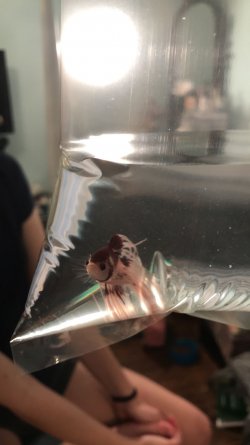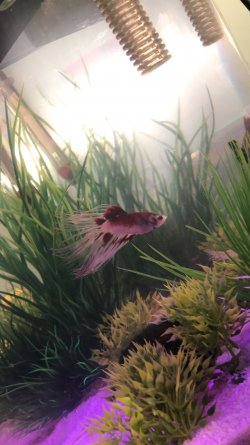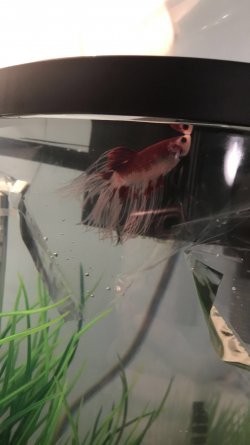Not sure if my betta has fin rot or if it’s black coloring? He has the black coloring on his gills too, so I’m not sure if it is coloring or rot of some kind. Would love to know your opinions! I have 5 ghost shrimp (they get along very well) with him in his tank, so I’ll have to either be very careful with what medicines I put in the tank or I’ll have to make a temporary hospital tank for him. I took these pictures before adding him to the tank so I’d have a reference for the coloring to see if there are any changes to how he looked when I first adopted him, so don’t fuss at me for keeping him in a baggie! Lol!
You are using an out of date browser. It may not display this or other websites correctly.
You should upgrade or use an alternative browser.
You should upgrade or use an alternative browser.
Rot or Not?
- Thread starter vnwatson
- Start date
The April FOTM Contest Poll is open!

🏆 Click to vote! 🏆
Looks pretty much the same in the before and after pics. However, there appears to be a black section at the bottom of the gill cover where it meets the body, that should not be there. That could be a genetic defect from inbreeding or colouration. But if it has always had the little black section at the bottom of the gill cover then it is fine.
----------------------
As a general rule, fin rot is caused by bacteria and normally occurs in dirty environments. If you have a filter on the tank and do regular partial water changes (50-75% each week) and gravel clean the substrate, your fish should never get it.
Make sure any new water is free of chlorine/ chloramine before it is added to the tank.
----------------------
As a general rule, fin rot is caused by bacteria and normally occurs in dirty environments. If you have a filter on the tank and do regular partial water changes (50-75% each week) and gravel clean the substrate, your fish should never get it.
Make sure any new water is free of chlorine/ chloramine before it is added to the tank.
Last edited:
SorryEh
Fish Fanatic
To add to what Colin said, fin rot is usually obvious, the fish will have a fuzzy look to its fins that looks like rot
All of the pictures are from when I first bought him. I received him with the black on the fins.Looks pretty much the same in the before and after pics. However, there appears to be a black section at the bottom of the gill cover where it meets the body, that should not be there. That could be a genetic defect from inbreeding or colouration. But if it has always had the little black section at the bottom of the gill cover then it is fine.
----------------------
As a general rule, fin rot is caused by bacteria and normally occurs in dirty environments. If you have a filter on the tank and do regular partial water changes (50-75% each week) and gravel clean the substrate, your fish should never get it.
Make sure any new water is free of chlorine/ chloramine before it is added to the tank.
Without pictures of his current state to compare we're just taking shots in the dark here.
But, I will say, if you are concerned that your betta doesn't look quite right, fresh water is a much better remedy than jumping to medication.
One of my male bettas had mild fin rot when I got him. Presumably from living in a cup his whole life. After a few weeks in a spacious tank with frequent water changes and no meds, his fins healed up nicely.
What size tank do you have him in? How often are you changing the water, and how much of the water are you changing? How long has the tank been running? If this tank is less than 2 months old, it might still be cycling. Do you have a test kit for ammonia, nitrites, and nitrates? What are those readings?
But, I will say, if you are concerned that your betta doesn't look quite right, fresh water is a much better remedy than jumping to medication.
One of my male bettas had mild fin rot when I got him. Presumably from living in a cup his whole life. After a few weeks in a spacious tank with frequent water changes and no meds, his fins healed up nicely.
What size tank do you have him in? How often are you changing the water, and how much of the water are you changing? How long has the tank been running? If this tank is less than 2 months old, it might still be cycling. Do you have a test kit for ammonia, nitrites, and nitrates? What are those readings?
All my readings are perfect. He’s in a 3.5 gallon tank (a bit small, but it’s the best I can do.) He has a filter and a heater, (though the water without the heater is a steady 75° and with the heater the water gets way too hot, so I leave it off currently.) I do a 50%-70% water change every week.Without pictures of his current state to compare we're just taking shots in the dark here.
But, I will say, if you are concerned that your betta doesn't look quite right, fresh water is a much better remedy than jumping to medication.
One of my male bettas had mild fin rot when I got him. Presumably from living in a cup his whole life. After a few weeks in a spacious tank with frequent water changes and no meds, his fins healed up nicely.
What size tank do you have him in? How often are you changing the water, and how much of the water are you changing? How long has the tank been running? If this tank is less than 2 months old, it might still be cycling. Do you have a test kit for ammonia, nitrites, and nitrates? What are those readings?
All my readings are perfect. He’s in a 3.5 gallon tank (a bit small, but it’s the best I can do.) He has a filter and a heater, (though the water without the heater is a steady 75° and with the heater the water gets way too hot, so I leave it off currently.) I do a 50%-70% water change every week.
I know exactly what kind of heater you're talking about... I hate those things. It's one of those heaters that just constantly adds heat to the water. Good that you have it off right now, because those heaters are dangerous and can't be left unattended. I don't understand why pet stores even sell them. I got one of those and returned it the next day, ended up getting another one for only $1 more that has a temperature sensor in it, and automatically turns itself on and off. It does a much better job of keeping the water at a consistent temperature, and there's no fear of it cooking my fish.
3.5 gallons is just fine for a single betta. As long as there's no other animals in the tank.
Do you have a water test kit that can test for ammonia and nitrites and nitrates? If not I highly suggest you get one. I know you said your "readings are perfect", but we need the actual numbers from those readings to see if anything jumps out as alarming to us. Pet stores will test your water for you, generally for free, if you don't have a test kit yourself. If you have the pet store test your water, make sure you write down the actual numbers from the test. Unfortunately, pet store employees (students working for minimum wage) don't really understand what the numbers mean, and far too often I've seen them tell someone their water is "fine" or "perfect" when in fact the water was unsafe for fish.
Last edited:
I know exactly what kind of heater you're talking about... I hate those things. It's one of those heaters that just constantly adds heat to the water. Good that you have it off right now, because those heaters are dangerous and can't be left unattended. I don't understand why pet stores even sell them. I got one of those and returned it the next day, ended up getting another one for only $1 more that has a temperature sensor in it, and automatically turns itself on and off. It does a much better job of keeping the water at a consistent temperature, and there's no fear of it cooking my fish.
3.5 gallons is just fine for a single betta. As long as there's no other animals in the tank.
Do you have a water test kit that can test for ammonia and nitrites and nitrates? If not I highly suggest you get one. I know you said your "readings are perfect", but we need the actual numbers from those readings to see if anything jumps out as alarming to us. Pet stores will test your water for you, generally for free, if you don't have a test kit yourself. If you have the pet store test your water, make sure you write down the actual numbers from the test. Unfortunately, pet store employees (students working for minimum wage) don't really understand what the numbers mean, and far too often I've seen them tell someone their water is "fine" or "perfect" when in fact the water was unsafe for fish.
My nitrate level is 0-20, Nitrite is 0-.5, harness is about a 100 (the only thing that struck me as particularly unusual), Alkalinity is 0-40 and pH is about a 6.9.I know exactly what kind of heater you're talking about... I hate those things. It's one of those heaters that just constantly adds heat to the water. Good that you have it off right now, because those heaters are dangerous and can't be left unattended. I don't understand why pet stores even sell them. I got one of those and returned it the next day, ended up getting another one for only $1 more that has a temperature sensor in it, and automatically turns itself on and off. It does a much better job of keeping the water at a consistent temperature, and there's no fear of it cooking my fish.
3.5 gallons is just fine for a single betta. As long as there's no other animals in the tank.
Do you have a water test kit that can test for ammonia and nitrites and nitrates? If not I highly suggest you get one. I know you said your "readings are perfect", but we need the actual numbers from those readings to see if anything jumps out as alarming to us. Pet stores will test your water for you, generally for free, if you don't have a test kit yourself. If you have the pet store test your water, make sure you write down the actual numbers from the test. Unfortunately, pet store employees (students working for minimum wage) don't really understand what the numbers mean, and far too often I've seen them tell someone their water is "fine" or "perfect" when in fact the water was unsafe for fish.
The only safe level is zero.Nitrite is 0-.5,
I wasn't aware of that. My test strips indicate that 0 is safe, while .5 is caution. Anything above .5 is indicated as danger.The only safe level is zero.
The worst part is, along with the bad heater, I had a bad thermometer which read a constant 78 deg. I ended up cooking a poor betta over night before I even realized the problem! It was absolutely awful. I still feel extremely sad and guilty for killing the little guy.I know exactly what kind of heater you're talking about... I hate those things. It's one of those heaters that just constantly adds heat to the water. Good that you have it off right now, because those heaters are dangerous and can't be left unattended. I don't understand why pet stores even sell them. I got one of those and returned it the next day, ended up getting another one for only $1 more that has a temperature sensor in it, and automatically turns itself on and off. It does a much better job of keeping the water at a consistent temperature, and there's no fear of it cooking my fish.
3.5 gallons is just fine for a single betta. As long as there's no other animals in the tank.
Do you have a water test kit that can test for ammonia and nitrites and nitrates? If not I highly suggest you get one. I know you said your "readings are perfect", but we need the actual numbers from those readings to see if anything jumps out as alarming to us. Pet stores will test your water for you, generally for free, if you don't have a test kit yourself. If you have the pet store test your water, make sure you write down the actual numbers from the test. Unfortunately, pet store employees (students working for minimum wage) don't really understand what the numbers mean, and far too often I've seen them tell someone their water is "fine" or "perfect" when in fact the water was unsafe for fish.
The LCD digital thermometers that stick on the outside of the tank can give false readings if pressed too hard so get a floating glass thermometer instead. And when you buy an aquarium thermometer, look at all the thermometers on the shelf and get one that has the same temperature as most of the others.
We regularly got thermometers at the shop and 9 would have the same temp but one would be 5-10 degrees higher or lower than the others. We would send the dodgy ones back
We regularly got thermometers at the shop and 9 would have the same temp but one would be 5-10 degrees higher or lower than the others. We would send the dodgy ones back
The worst part is, along with the bad heater, I had a bad thermometer which read a constant 78 deg. I ended up cooking a poor betta over night before I even realized the problem! It was absolutely awful. I still feel extremely sad and guilty for killing the little guy.
That is terrible! But live and learn, right? I'm sure moving forward you'll be testing thermometers, and buying heaters that have a temp sensor. Mistakes you only make once.
I wasn't aware of that. My test strips indicate that 0 is safe, while .5 is caution. Anything above .5 is indicated as danger.
Nitrite is toxic to fish like ammonia is. You should test your water for both, and if you get a reading above 0 on either one, change the water.
Staff online
-
EssjayModerator
-
emeraldkingModerator
Members online
Total: 364 (members: 10, guests: 354)




